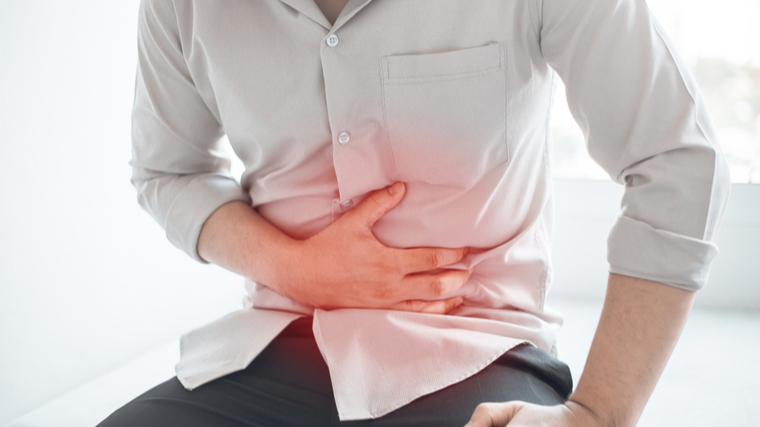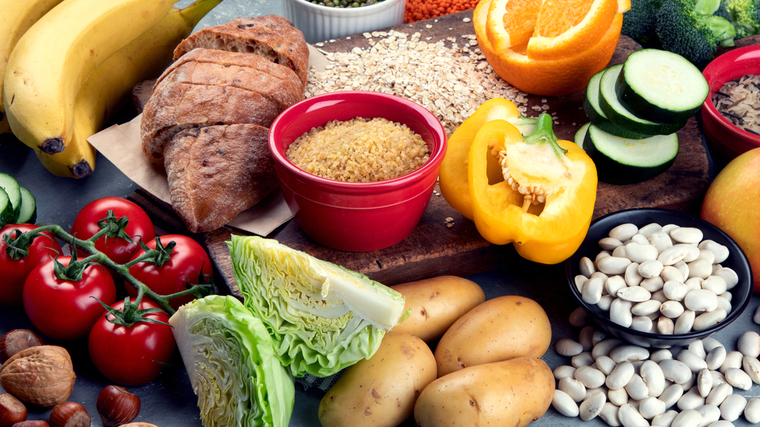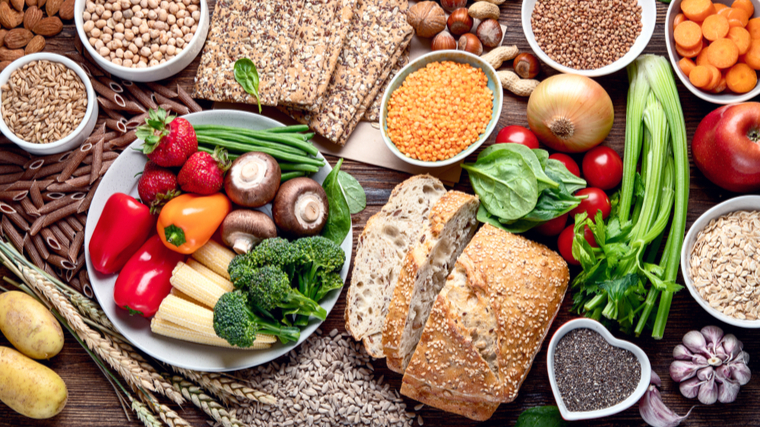When you’re about to step onto the platform, you want to feel eager, excited, and ready to tighten up your lifting belt. But if you’ve ever experienced bloating, you know that it can seriously interfere with your training — not to mention your everyday life. Bloating can be uncomfortable and distracting, and in some cases could be the sign of an illness or food intolerance.
Bloating is one of the most common gastrointestinal (GI) complaints in the United States, affecting an estimated 20% of Americans on a weekly basis. (1) Even though you may not be able to avoid the dreaded bloat entirely, your stomach might benefit from changing your eating habits or food choices. It’s also important to know when bloating might be a cause for concern — and a sign to see your doctor.

- What Causes Bloating?
- What Foods Cause Bloating?
- Should You Be Concerned About Bloating?
- How to Reduce Bloating
Note: The content on BarBend is meant to be informative in nature, but it should not be taken as medical advice. When starting a new training regimen and/or diet, it is always a good idea to consult with a trusted medical professional. We are not a medical resource. The opinions and articles on this site are not intended for use as diagnosis, prevention, and/or treatment of health problems. They are not substitutes for consulting a qualified medical professional.
What Causes Bloating?
Bloating refers to a sense of fullness, pressure, or gassiness in the abdomen. Distension, a visible expansion of the abdomen, often occurs with bloating, but they’re separate phenomena. (2)
Bloating has many potential causes, from your eating habits to your gut microbes. Certain factors like the location and timing of the sensation after meals, or the presence of other symptoms, can provide clues about the potential origin of your bloating dilemma.
Speed-Eating and Swallowing Air
When you’re eating on the go, gulping quickly with big bites and minimal chewing, you likely swallow a large amount of air. This can also occur if you eat very large meals, have an irregular eating pattern, or frequently drink carbonated beverages. (3)
Swallowed air is usually expelled in burps before it reaches your intestines where it could cause bloating, but if you notice that you’re belching a lot after your meals and feeling bloated and gassy a few hours later, you might feel better if you slow down your eating behaviors.
Gas from Your Gut Microbes
Your gut is filled with trillions of microbes that primarily produce energy via carbohydrate fermentation, which results in gas production. Some carbohydrates are more fermentable than others, which means they will lead to the formation of more gas. Some literature theorizes that certain people may be “colonized” with an especially active set of gas-producing microbes, or that a microbial overgrowth could contribute to excess gas production. (1)(3)

Other studies have contradicted this idea, finding no relationship between a microbial “overgrowth” and bloating. (4) While the jury is out, it’s likely that there is some level of correlation between your gut biome and your propensity towards experiencing a bloat.
Constipation
Gas isn’t always the culprit when it comes to bloating. In some cases, infrequent or incomplete bowel movements could cause those feelings of uncomfortable pressure and fullness. Like bloating, constipation has many potential causes ranging from inadequate fiber intake to pelvic floor dysfunction or even stress. (3)
Bowel Disease
Chronic bloating can be a symptom of a number of bowel diseases such as Irritable Bowel Syndrome, Inflammatory Bowel Disease, or Celiac Disease. Though the causes are still unknown, researchers theorize that it could be due to imbalanced gut microbes, abnormal contractions of the gut wall, altered nervous system activity that results in heightened sensations of bloating and discomfort, or a combination of these factors. (3)(4)
What Foods Cause Bloating?
If you’ve been searching for ways to manage bloating, you may have seen the term “low-FODMAP.” FODMAP stands for fermentable oligo-, di-, and monosaccharides and polyols. Humans lack the digestive enzymes required to break most of these carbs down for absorption — or in some cases they’re just absorbed slowly — so they pass through the small intestine largely intact before reaching the large intestine where they’re fermented by your gut microbes. Some of them also attract water into the gut which can lead to bloating and loose bowel movements. (5)
Fruits, Veggies, Grains, and Beans
Foods high in soluble fiber tend to be high in FODMAPs, too. Some of the highest-FODMAP foods include:
- Honey
- Milk or other dairy containing lactose
- Garlic
- Onions
- Cauliflower
- Mushrooms
- Artichokes
- Avocados
- Apricots and other pitted fruits
- Apples
- Wheat
- Cashews
- Pistachios
- Beans
- Dried fruits
Although these foods might lead to some gas production, they’re important sources of energy for your gut microbes. Many of the foods that contain FODMAPs are beneficial for your health, too. Removing them entirely could be risky for you and your gut bugs. (6)
Protein Shakes, Protein Bars, and “Diet” Foods
Some protein shakes and protein (or meal replacement) bars contain ingredients that can cause bloating such as whey protein concentrate and inulin (sometimes labeled as chicory root). Many products labeled low-carb or sugar free are also sweetened with sugar alcohols, which can have a laxative effect.
Unlike whey protein isolate, whey concentrate contains lactose, which can cause GI distress in people with lactose intolerance. Inulin is highly fermentable and is also considered prebiotic, which means it’s utilized by beneficial microbes. It’s also considered a “functional fiber,” one that is added to foods to enhance their fiber content, and ostensibly, their potential health benefits. But because it’s so fermentable, inulin can result in a lot of gas and bloating. (7)
Sugar alcohols such as sorbitol and xylitol are sometimes used to replace sugar in items like meal replacement bars, chocolate, breakfast syrup, and ice cream. They belong to the class of FODMAPS called polyols, and they’re both highly fermentable and likely to draw water into the gut. (8) In the United States, the Food and Drug Administration (FDA) requires foods high in sorbitol to be labeled as, “excess consumption may have a laxative effect.” (9)
Should I Be Concerned About Bloating?
Bloating is often benign, but if it’s so severe that your quality of life is suffering, it could be the sign of something more serious. If your bloating is accompanied by other symptoms like frequent diarrhea or constipation, abdominal pain, unintentional weight loss, or bloody stool, it’s definitely time to see your doctor. (3)
How to Reduce Bloating
Currently, there aren’t any medications or validated medical management options solely for the treatment of bloating. (2) Everyone experiences gas and bloating from time to time, and gas production is a normal part of the digestive process. However, if you’ve noticed that your lifestyle might be contributing to frequent discomfort from gas and bloating, here are some changes for you to consider.
Regulate Your Meal Times
Waiting until you’re famished before eating is likely to result in a rushed meal experience, with the big bites and minimal chewing mentioned earlier. In an observational study of patients with IBS, an irregular meal pattern was associated with more severe GI symptoms. (10)
Subjects’ symptoms improved when they established a more stable mealtime routine, but they also adopted other changes, like reducing sweets and eating more fruits and veggies. It’s unclear whether the regular meal pattern alone reduced their symptoms, but based on these findings, it’s a reasonable, low-risk modification to your habits.
Get Some Light Exercise
Regular exercise can reduce some symptoms of IBS and chronic constipation, perhaps due to its effects on gastric motility. (3) In a small trial of healthy adults, a single session of mild physical activity on an exercise bike accelerated the movement of gas through the intestines, which may reduce the sensation of bloating or distention. (11)
Intense endurance exercise, on the other hand, can actually cause GI distress in some people. (12) So if you’re aiming for relief, take it easy with a light ride or a brisk walk.
Eat Fiber and Drink Water
Fiber plays an important role in the production of comfortable bowel movements, and in some cases, inadequate fiber could have something to do with your bloating. If that’s the case, more fiber could help, but some context is required here. Not all fibers behave the same, and more fiber isn’t always helpful.
Insoluble fibers — like fibrous strings of celery or hardy apple skins — create bulk in the stool and speed its passage through your gut. Soluble fibers, like the type you’ll get in beans or oats, soak up liquid and slow the passage of stool. Many soluble fibers are fermentable, so they can lead to gas production. Insoluble fibers aren’t readily fermented, so they’re less likely to contribute to gas. (13)

In the United States, current recommendations are that women ingest 25 grams of fiber per day, while men should aim for 38 grams per day. If you aren’t hitting these numbers and want to work on increasing your fiber consumption, it’s important to do so slowly in order to prevent potential GI distress. (13) You could add two grams to your daily intake with one cup of cooked broccoli, for example, or three grams with a medium-sized orange.
A tolerable upper limit hasn’t been formally established for fiber, but a subjective, comfortable limit exists on an individual basis. (13) So, if you’re already exceeding the recommended amounts, increasing your fiber intake might not be the most useful option. Your level of hydration also augments the efficacy of fiber intake, so you might need to pay attention to your water intake instead. Even moderate dehydration could increase your chances of becoming constipated and feeling bloated. (14)
Try a Science-Backed Supplement
Many “gut health” supplements make bold claims based on weak evidence, but there are a few options supported by moderate-or high-quality studies with human participants.
Probiotics
A recent meta-analysis examined the effect of probiotics on bloating scores from 17 studies with over 1,400 participants who had IBS. Probiotics significantly reduced the scores, but when the authors tried to determine which strain or combination was most effective, no clear winner emerged. (15)
However, another analysis attempted to identify the effects of specific probiotic strains on IBS symptoms and determined that probiotics weren’t effective for bloating (but they did improve abdominal pain.) (16) In a small number of studies, Lactobacillus acidophilus, Bifidobacterium infantis, and Bifidobacterium lactis have sometimes been effective for reducing bloating (compared to a placebo.) (17)
Digestive Enzymes
Research on digestive enzymes is similarly contradictory. Two randomized, double-blind, placebo-controlled trials enrolled a similar number of participants with IBS to test the effects of the digestive enzyme α-galactosidase, which is marketed to reduced gas associated with a type of FODMAP found in foods like beans and broccoli. The two studies came to opposite conclusions, with one (using a smaller dose) reporting a significant reduction in symptoms (18) and the other (using a much larger dose) finding no difference between the enzyme and placebo. (19)
While digestive enzymes might not be consistently effective for reducing gassiness after a serving of beans and cruciferous veggies, you might have more luck if your bloating is caused by lactose intolerance. People with lactose intolerance have a hard time digesting dairy because they don’t produce enough lactase to break down the lactose in many dairy products. A number of studies indicate that lactase or beta-galactosidase supplementation can reduce GI distress when taken with a meal that contains dairy. (20)
Go Low-FODMAP
The low-FODMAP diet is one possible way to reduce symptoms of IBS or exercise-induced gastrointestinal distress, but it isn’t intended to be a long-term dietary pattern or way of life. The diet consists of three phases to temporarily reduce FODMAP intake, systematically test your tolerance to each FODMAP group, and then gradually reintroduce FODMAPs. (6) You should introduce a FODMAP diet under guidance from a trained health professional.
Like any restrictive diet, long-term adherence to a low-FODMAP diet could make it difficult to meet your nutritional needs. It also has been shown to reduce certain beneficial gut microbes. You should introduce a FODMAP diet under guidance from a trained health professional.
Summary
With so many potential causes, bloating is often a common occurrence that could be considered a normal and benign part of the digestive process. In some cases, though, it may indicate a more serious problem. If you’re feeling down in the gym due to a bloated stomach, you should visit a doctor.
But if you’re just a bit on the uncomfortable side, some simple changes to your eating habits, food choices, and cranking up your water intake, can provide some welcome relief to the unwelcome discomfort.
References
- Zhang, M., Juraschek, S. P., Appel, L. J., Pasricha, P. J., Miller, E. R., & Mueller, N. T. (2020). Effects of High-Fiber Diets and Macronutrient Substitution on Bloating: Findings From the OmniHeart Trial. Clinical and Translational Gastroenterology, 11(1), e00122. https://doi.org/10.14309/ctg.0000000000000122
- Nelson, A. D., Black, C. J., Houghton, L. A., Lugo-Fagundo, N. S., Lacy, B. E., & Ford, A. C. (2021). Systematic review and network meta-analysis: efficacy of licensed drugs for abdominal bloating in irritable bowel syndrome with constipation. Alimentary Pharmacology & Therapeutics, 54(2), 98–108. https://doi.org/10.1111/apt.16437
- Wilkinson, J. M., Cozine, E. W., & Loftus, C. G. (2019). Gas, Bloating, and Belching: Approach to Evaluation and Management – American Family Physician. American Family Physician, 99(5), 301–309. https://www.aafp.org/afp/2019/0301/p301.html
- Saffouri, G. B., Shields-Cutler, R. R., Chen, J., Yang, Y., Lekatz, H. R., Hale, V. L., Cho, J. M., Battaglioli, E. J., Bhattarai, Y., Thompson, K. J., Kalari, K. K., Behera, G., Berry, J. C., Peters, S. A., Patel, R., Schuetz, A. N., Faith, J. J., Camilleri, M., Sonnenburg, J. L., … Kashyap, P. C. (2019). Small intestinal microbial dysbiosis underlies symptoms associated with functional gastrointestinal disorders. Nature Communications, 10(1), 1–11. https://doi.org/10.1038/s41467-019-09964-7
- Altobelli, E., Del Negro, V., Angeletti, P., & Latella, G. (2017). Low-FODMAP Diet Improves Irritable Bowel Syndrome Symptoms: A Meta-Analysis. Nutrients, 9(9), 940. https://doi.org/10.3390/nu9090940
- Barrett, J. S. (2017). How to institute the low-FODMAP diet. Journal of Gastroenterology and Hepatology, 32, 8–10. https://doi.org/10.1111/jgh.13686
- Ahmed, W., & Rashid, S. (2019). Functional and therapeutic potential of inulin: A comprehensive review. Critical Reviews in Food Science and Nutrition, 59(1), 1–13. https://doi.org/10.1080/10408398.2017.1355775
- Plaza-Diaz, J., Pastor-Villaescusa, B., Rueda-Robles, A., Abadia-Molina, F., & Ruiz-Ojeda, F. J. (2020). Plausible Biological Interactions of Low- and Non-Calorie Sweeteners with the Intestinal Microbiota: An Update of Recent Studies. Nutrients, 12(4), 1153. https://doi.org/10.3390/nu12041153
- CFR – Code of Federal Regulations Title 21. (n.d.). Retrieved February 11, 2022, from https://www.accessdata.fda.gov/scripts/cdrh/cfdocs/cfcfr/CFRSearch.cfm?fr=184.1835&SearchTerm=sorbitol
- Nilholm, C., Larsson, E., Roth, B., Gustafsson, R., & Ohlsson, B. (2019). Irregular Dietary Habits with a High Intake of Cereals and Sweets Are Associated with More Severe Gastrointestinal Symptoms in IBS Patients. Nutrients, 11(6). https://doi.org/10.3390/nu11061279
- Wilkinson, J. M., Cozine, E. W., & Loftus, C. G. (2019). Gas, Bloating, and Belching: Approach to Evaluation and Management – American Family Physician. American Family Physician, 99(5), 301–309. https://www.aafp.org/afp/2019/0301/p301.html
- Costa, R. J. S., Snipe, R. M. J., Kitic, C. M., & Gibson, P. R. (2017). Systematic review: exercise-induced gastrointestinal syndrome-implications for health and intestinal disease. Alimentary Pharmacology & Therapeutics, 46(3), 246–265. https://doi.org/10.1111/apt.14157
- McRorie, J. W. J. (2015). Evidence-Based Approach to Fiber Supplements and Clinically Meaningful Health Benefits, Part 2: What to Look for and How to Recommend an Effective Fiber Therapy. Nutrition Today, 50(2). https://journals.lww.com/nutritiontodayonline/Fulltext/2015/03000/Evidence_Based_Approach_to_Fiber_Supplements_and.9.aspx
- Arnaud, M. J. (2003). Mild dehydration: a risk factor of constipation? European Journal of Clinical Nutrition, 57(S2), S88–S95. https://doi.org/10.1038/sj.ejcn.1601907
- Niu, H.-L., & Xiao, J.-Y. (2020). The efficacy and safety of probiotics in patients with irritable bowel syndrome: Evidence based on 35 randomized controlled trials. International Journal of Surgery, 75, 116–127. https://doi.org/10.1016/j.ijsu.2020.01.142
- McFarland, L. V., Karakan, T., & Karatas, A. (2021). Strain-specific and outcome-specific efficacy of probiotics for the treatment of irritable bowel syndrome: A systematic review and meta-analysis. EClinicalMedicine, 41. https://doi.org/10.1016/j.eclinm.2021.101154
- Lacy, B. E., Gabbard, S. L., & Crowell, M. D. (2011). Pathophysiology, evaluation, and treatment of bloating: hope, hype, or hot air?. Gastroenterology & hepatology, 7(11), 729–739.
- Tuck, C. J., Taylor, K. M., Gibson, P. R., Barrett, J. S., & Muir, J. G. (2018). Increasing Symptoms in Irritable Bowel Symptoms With Ingestion of Galacto-Oligosaccharides Are Mitigated by α-Galactosidase Treatment. The American journal of gastroenterology, 113(1), 124–134. https://doi.org/10.1038/ajg.2017.245
- Böhn, L., Törnblom, H., Van Oudenhove, L., Simrén, M., & Störsrud, S. (2021). A randomized double-blind placebo-controlled crossover pilot study: Acute effects of the enzyme α-galactosidase on gastrointestinal symptoms in irritable bowel syndrome patients. Neurogastroenterology and motility : the official journal of the European Gastrointestinal Motility Society, 33(7), e14094. https://doi.org/10.1111/nmo.14094
- Deng, Y., Misselwitz, B., Dai, N., & Fox, M. (2015). Lactose Intolerance in Adults: Biological Mechanism and Dietary Management. Nutrients, 7(9), 8020–8035. https://doi.org/10.3390/nu7095380
Featured Image: Chompoo Suriyo / Shutterstock